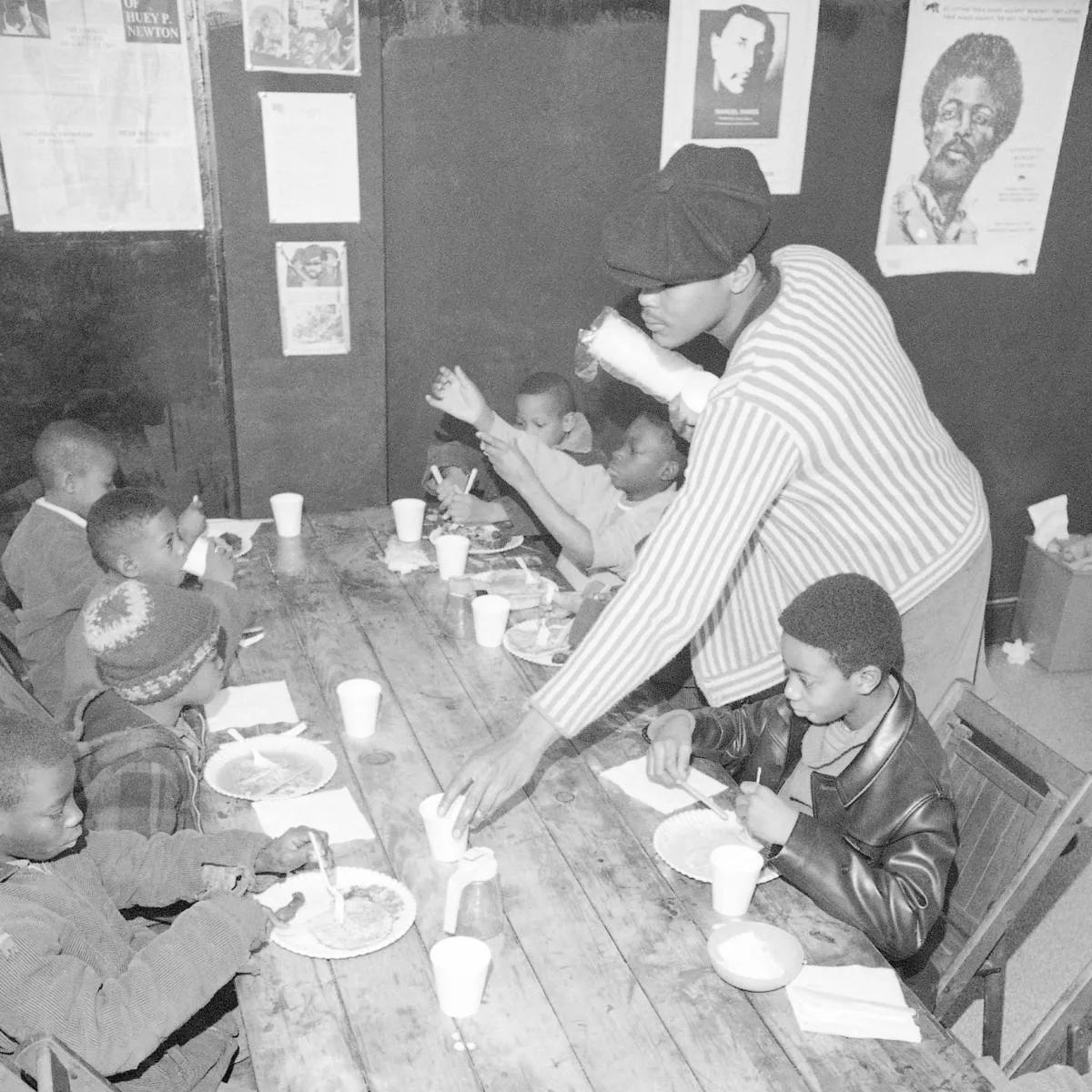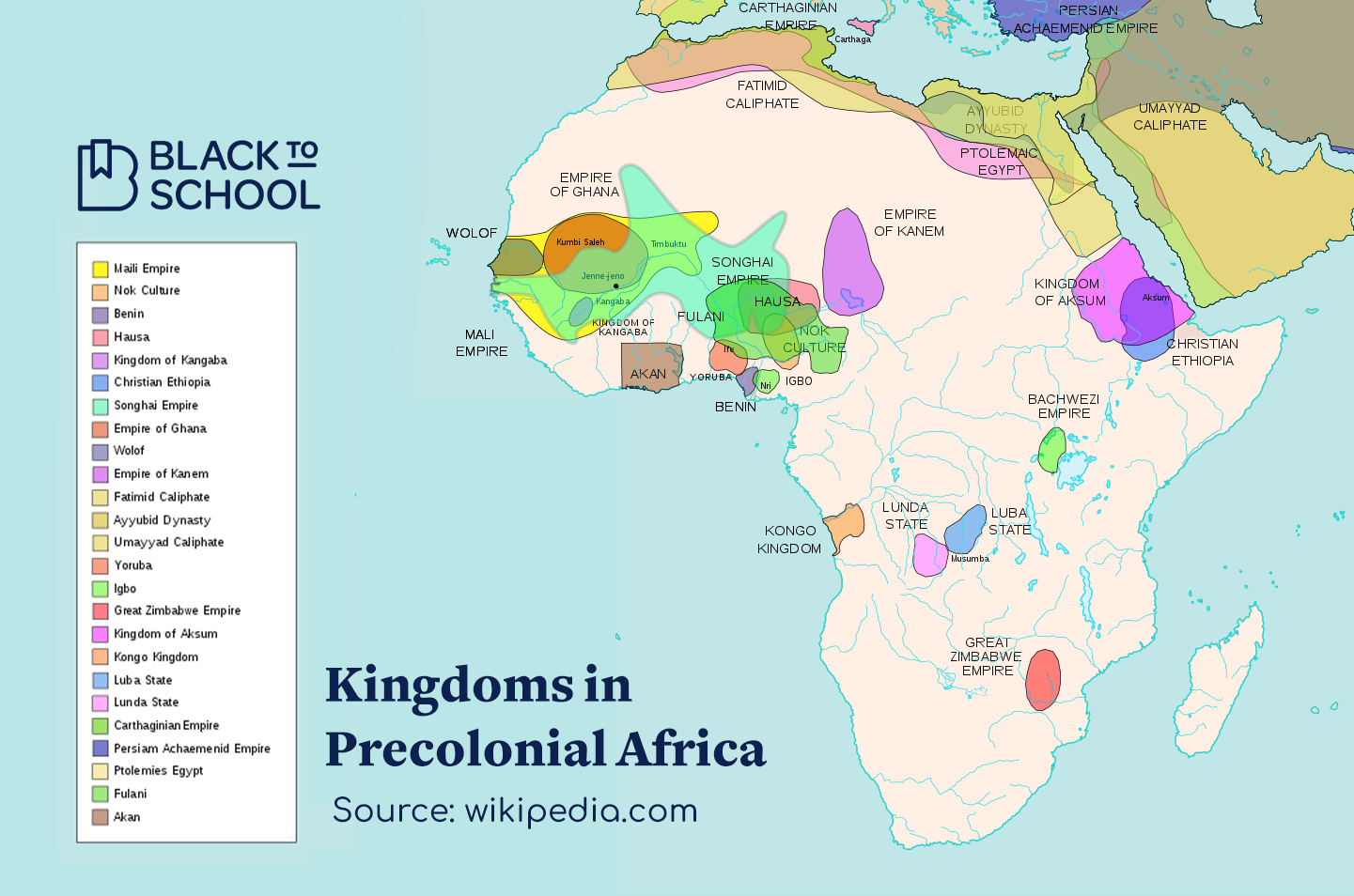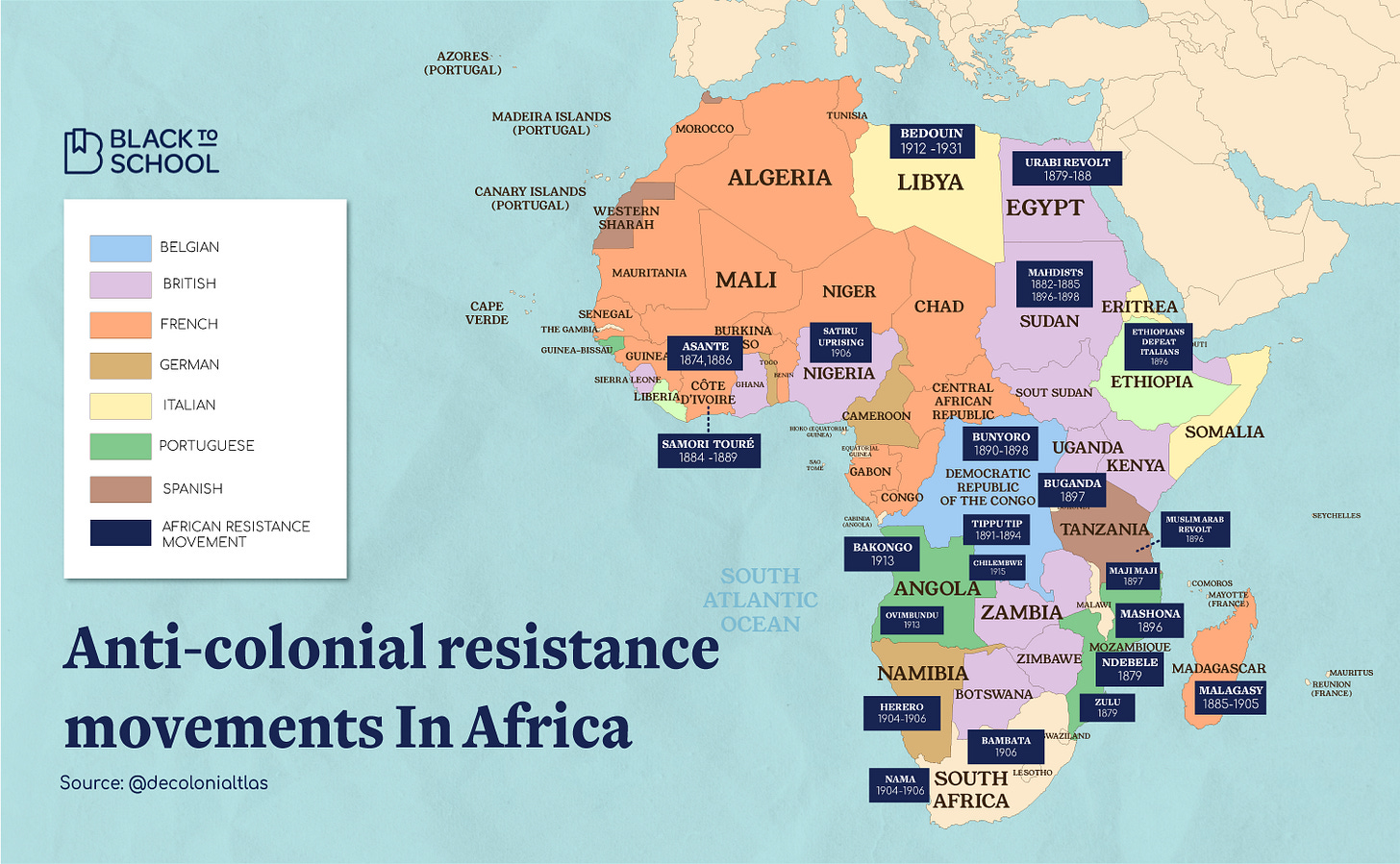📚Black To School: Issue #25
Black Is Sovereign ✊🏾: From Resisting Imperialism and Controlling Global Trade to Modeling Community Self-Reliance

For anyone new to Black To School, we explore the history and contributions of Africans and the African diaspora to global society. Our goal is to learn from these stories, draw inspiration, and make a positive change in our own lives, homes, and communities. The “Why?” that powers our mission is simple. “Our ancestors invented the table that the world now sits at. It’s time to not just claim our seat, but to set the agenda.”
If you received a forwarded issue, you can subscribe to Black To School here.
✊🏾 Welcome to Issue #25!
As we near the anniversary of Juneteenth here in the United States, we’re taking the time to explore agency throughout time and what it means to be independent. Join us as we explore the continent's history, ancient trade and battles, community organizing, and the commitment to self-determination.
If you haven’t seen it yet, please check out our feature on SubStack! Read our interview here. Thank you to all readers for your continuing support!
Black Is Sovereign:
We wrestled with a keyword that could best communicate our theme for this issue, and in the end, “sovereign” was the clear winner. Unlike the words “independent” and “free,” the term sovereign doesn’t beg the question “From who?” or “From what?”. Sovereignty is a state of mind and a truth that exists irrespective of your immediate circumstances. It’s a pact between the people of one nation and leaders within a region to stand together, united. It’s a statement about with whom and for whom ultimate power to live, love, govern, and protect resides.
After the many migrations, new settlements, large and small conflicts, and re-settlements, Africa and the Caribbean now have 54 and 16 sovereign nation-states, respectively. In addition, individuals and indigenous communities are emerging to assert and manifest Africa’s sovereignty in the digital world. And yet, globalization and the complex web of multinational companies from British Petroleum, Hershey & Big Chocolate, and MTN to multilateral organizations like the World Bank, IMF, World Trade Organizations, International Criminal Court, and the United Nations are cause for continued debate about the mythical nature, limitations, and modern relevance of national sovereignty.
In the end, sovereignty is both a right and a responsibility that is not without its challenges.
What’s The Story? These Are The Facts.
Our Coalition for Imperial Resistance
There is some irony in covering one of the most remarkable military feats in the ancient world in a conversation about sovereignty. Nonetheless, it was an incredible process of bringing together a coalition of roughly 90,000 soldiers from different cultures (along with 12,000 cavalries and 40 war elephants). We’re talking about the battle of Cannae, where a union from the maritime state of Carthage (located in modern-day Tunisia) had such strength that people claimed they brought the Roman Empire to its knees during the second Punic War (264 to 162 BC).
Hannibal became an officer in the Carthage army and, by the age of 26, was chosen to command it. Both Hannibal (and his father, Hamilcar Barca), originally from ancient Libya, were legendary for being military strategists, organizing massive armies, and exploiting weaknesses. Hannibal has been called the “father of strategy,” and many of his tactics were later adopted by Roman armies and students of history, mythology, warfare, diplomacy, and influence.
Unlike most states at the time that tended to conscript their citizens into a structured army, the alliance formed by Hannibal for this campaign relied heavily on the mercenary military. Essentially they hired soldiers from Carthage and neighboring communities to supplement citizen-soldiers. The army was composed of mercenary soldiers from vastly different backgrounds, motivations, and skill sets. A seemingly risky strategy because mercenary soldiers were regarded as unreliable forces who could enact a mutiny at any time. However, Carthage military leaders put in place five types of controls that enabled them to leverage this diversity as a strength to deliver a devastating blow to the Roman empire killing 50,000 Roman soldiers while comparatively losing 6,000 soldiers.
Established alliances that provided neglected communities with necessities the Roman government would not offer.
Formed marriage alliances between Carthaginian commanders and allied groups as it made it easier to secure loyal troops.
Paid in a timely fashion by their generals rather than the state, further solidifying their commitment to their general.
Reduced their autonomy by ensuring their captains were observed by Carthaginian captains.
Ensured they were never idle and were constantly on a military campaign to sustain their loyalty to their captains.
These various methods engineered a reliable, cohesive unit that could fight in different formations as one. Carthage's mercenary army’s diversity gave them a competitive edge. They were flexible and had a range of skills and tactics to coordinate. Although, ultimately, Hannibal’s army was unable to maintain its strategic advantage and lost. Their legacy is that they formed a coalition so strong and determined that they successfully shifted the power dynamics throughout the region.
We Controlled Trade Routes From North Africa And Europe To Asia
Ancient Somali “Arjun” empire known as the Land of Punt, beginning in the 13th century, controlled commerce and trade routes along with the most critical, complex, and expansive commercial network in the ancient world from the Horn of Africa to northwest Europe to China. Somali cities, Mundus and Mosylon, had shrewd merchants who grew rich, buying and reselling luxurious goods to traders around the world. They sold products like 31 different incense trees, myrrh, cosmetics, Indian spices (e.g., cinnamon), ebony, ivory, date palms, gold, and wild animals. They were so effective at hiding their sources that their Mediterranean trading partners believed that Somalia was the point of origin for all of these treasures.
Somalia was not only a source of luxury commercial goods but also a destination for ancient royals from Egypt, Kush, and other communities for education. Ancient Somalia was seen as a cultural mecca and an ancestral home. It was a source of inspiration for beauty, architecture, fashion, health, and nutrition. Although the exact location of Punt along the Red Sea (i.e., Djibouti, Eritrea, Ethiopia, and Somalia) has long been the subject of archaeological inquiry and investigation, the strength of its trading prowess and economy in Africa and the world is well documented. They established a robust governance structure and military defenses to prevent foreign invasion attempts from all sides. The 1,100-year trading history between the sovereign nations of Egypt and Punt and their long-distance seafaring practices “drove the evolution of maritime technology.”
Relentless In Our Commitment To Self-Determination
In the late 18th century, intense rebellion and resistance to foreign interference were commonplace across the Black diaspora between the Americas in the West and Africa.
After both the British and the Spanish invasions of Jamaica, Queen Nanny, also known as “Nanny of the Maroons,” led a guerilla war against the British. The Windward Maroons, thought to be originally from the Akan people of Ghana, were masterful in maneuvering against their enemies with:
deep knowledge of the terrain and strategic settlements,
a stealth trade network for exchanging food, weapons, clothes, and other supplies,
long-range, coded communication system and tools (i.e., abeng made from cow horn), and
mastery in the art of camouflage (e.g., disguise, inaudible breathing, and stealthy fires).
Queen Nanny’s conflict training is unverified, yet her military instincts were unrivaled, which may explain the fascination with how she could accomplish so much in the face of such formidable opposition. The legends and religious lore about her magic and charms abound. In the end, by 1738, unable to shake or break the Maroon forces, the British sued for peace and signed a treaty with Jamaica to recognize the Maroons’ perpetual freedom. The Maroons were effectively accepted as a free state within the nation-state of Jamaica. Nanny Town, now known as Moore Town, Jamaica, is recognized by the government of Jamaica and the United Nations as an autonomous region self-governed by the Maroon people. To both celebrate Jamaica’s triumph and commemorate her leadership, the Government of Jamaica declared Nanny a “National Hero,” one of only seven in history and the only identified as female.
Starting in 1790, masterful generals like Toussaint L’Ouverture led Haiti's revolution. On the heels of the French Revolution, there were ideals espoused by radicals in Paris and documented in the “Declaration of the Rights of Man” as foundational principles of their new democracy. With a conspicuously aligned proclamation “Egalite for All,” Touissant and his homegrown and trained 3,000 man-army fought the French, British, and Spanish forces for 12 years. Haiti’s military delivered success, and they became the first independent black republic and Caribbean nation-state in the Western Hemisphere. They not only forced the French to exit Haiti but also weakened their imperial ambitions so dramatically that it drove them to pull out of the U.S. and North America, ultimately leading to France’s Louisiana sale in 1803.
The U.S. Black Power Movement Inspired The Federal Free Breakfast Program
The Black Panther Party, a volunteer-based, civilian-led army initially organized to end police brutality in Oakland, later took on a greater charge to achieve self-reliance and reclaim self-determination in Black neighborhoods across the country. One of their most successful community programs, launched in 1969, is the Free Breakfast Program. They observed that many kids were going to school hungry (and thus unable to focus and learn). In response, the Black Panther Party launched the Breakfast Program. At its peak, it fed thousands of children daily across its 45 programs and expanded to provide medical and legal services.

Though addressing the needs of underfed local kids was one objective, the Black Panther Party intentionally sought to build support and allies in the community for their Black Power agenda. Threatened by the organizing potential that this Breakfast Program unlocked, FBI Director Hoover wrote in an internal memo, “The [Program] represents the best and most influential activity going for the BPP and, as such, is potentially the greatest threat to efforts by authorities to neutralize the BPP and destroy what it stands for.” The Black Panther’s Breakfast Program eventually went viral and was studied by leaders across the globe, including the very institutions they were defending themselves against. After a limited set of small pilot experiments in the 1960s funded by the U.S. Department of Agriculture, in 1975, six years after the launch of the Black Panther Party’s successful Breakfast Program, the federal government made a permanent commitment to serving free breakfast to school children of all races, ethnicities, and socio-economic backgrounds across the country.
The National School Breakfast Program now feeds 11.8 million kids for free across 78,000 public schools. Most recently, political leaders like Former First Lady Michelle Obama continued this tradition with her “Let’s Move,” healthy food and nutrition initiative.
What’s New? We Keep Building the Future.
Sovereignty should truly be a verb. There is action within and without to be a self-determined individual, let alone a community. So what is sovereignty to you, and what does Black sovereignty mean? Should it be fractured, coalesced, or does that even matter? Here are a just a few provocations that you may not have heard about to the traditional nation-states that are still raging on:
The Koi San of South Africa
Palenque de San Basilio, Colombia
The Ngorongoro Maasai, Tanzania
The Sahrawi People, Western Sahara
The topic of black sovereignty is as large and complex as those two encompassing words. And while we are built around the agency of self, here is an interesting bit of academia to archive what we know and where we could go. Check out Queer Freedom: Black Sovereignty by Dr. Ana-Maurine Lara.
🛠️ The Black To School Toolkit
Still curious? Dig deeper on your own, grow with your family, and learn how you can impact change in your own backyard:
For You: This is how leaders committed to sovereignty roll. Read these biographies on Hannibal, the African warrior, Queen Nanny of the Windward Maroons, and Toussaint L’Ouverture. Want more? Check out these maps of sovereign Africa before and after the post-European Enlightenment disruption.
For Family: Read your kids (3rd to 6th Grade) a bedtime story about the Haitian Revolution and how it inspired change in both the Americas and Africa that will be a source of pride for them. Enjoy these games while learning about Queen Nanny, created by Black History Activity Books. Do you have preteens and teens with questions? Get them answered by having them watch this epic conversation (viewed by millions) between present-day kids and former members of the Black Panther Party.
For Community: Learn from this online course and connect via a private Facebook group and Discord chat with others exploring questions about personal sovereignty. Traveling between countries in Africa? Legal boundaries are blurring and opening up on the continent. Find out here which countries issue visas upon arrival, e-visas, or don’t require a visa at all.



